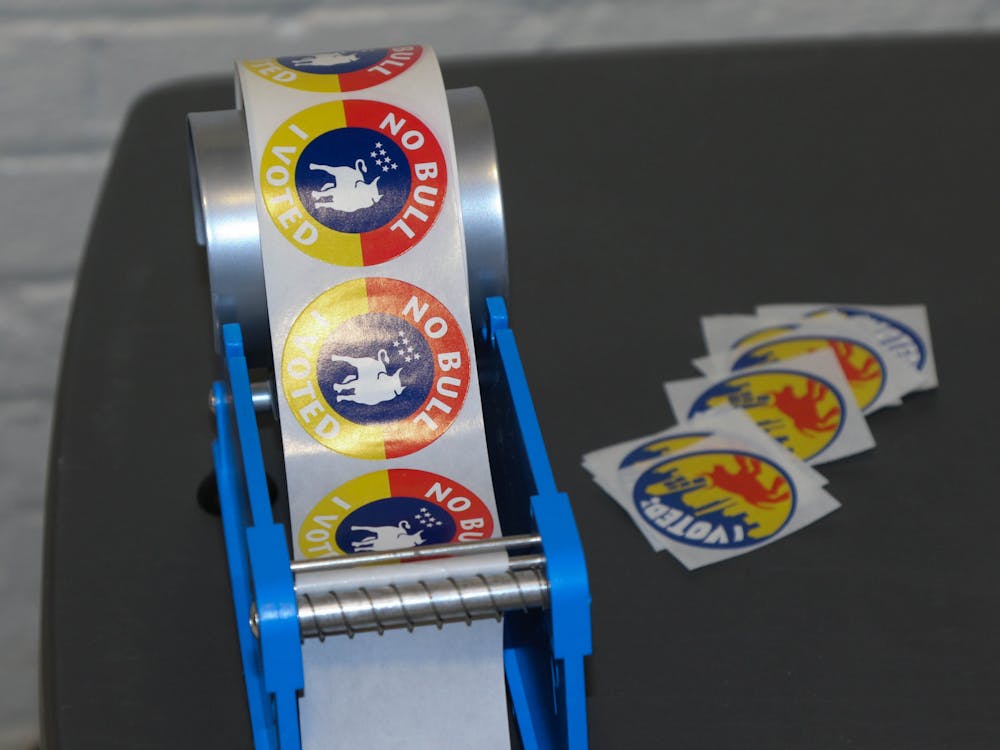With primary elections underway, Duke student groups and research teams are working to inform and address the obstacles college students face at the polls, including provisional ballots and voter ID laws.
The 2024 primary elections will be held Tuesday, with polls open from 6:30 a.m. to 7:30 p.m. The early voting period ended Saturday.
Six Duke student organizations hosted Democracy Day, a university-wide event Friday on the Bryan Center Plaza, to promote civic engagement and provide Duke community members with election information before heading to the polls.
The main set of issues that student voters face, according to senior Pilar Kelly, chair and student voting coordinator of Duke Votes, is the decision of whether to keep their voter registration in their home state or to re-register in North Carolina and whether they can even vote as an out-of-state student.
According to Associate Professor of History Gunther Peck, many students have been unknowingly disenfranchised because of flaws in the registration system, specifically related to address-related issues.
Peck partially attributes this disenfranchisement to provisional ballots, which he said are most likely to be cast by students since their addresses change often. He added that students have the highest throw rate of provisional ballots, meaning that their application to file a provisional ballot is denied.
Provisional ballots, which Peck referred to as a “failsafe of voting,” aim to preserve voting rights when a voter’s eligibility is in question. Voting at the wrong precinct, forgetting to update the address on one’s registration or having issues with one’s voter record qualify an individual to cast a provisional ballot.
Kelly said that since different dorms on campus have different addresses and sometimes different precincts on Election Day, students might need to update their registration every year they spend at Duke.
Additionally, according to Peck, one of the main reasons that students’ ballots are not counted is because they list their dormitory residential address instead of their mailing address, meaning their voter registration confirmation is undeliverable.
The logistical problems that students face both with registration as a whole, as well as within the details of their applications, lead to their votes not being counted.
“Durham County was one of the worst places in the state for this problem, and it's particularly bad at [North Carolina Central University],” Peck said. In the 2022 elections, students were unaware they had to go to their precinct on Election Day, and many listed their residential addresses. Peck’s research team found that at NCCU, 47% of the ballots cast were thrown out.
“The worst, most insidious part of this problem we uncovered is that most people who cast provisional [ballots] have no idea they are casting provision[al ballots], and don't even know their vote didn't count,” Peck said.
In Peck’s Bass Connections course, “Elections in a Pandemic,” students researched voter access in Durham beginning in 2020.
“I had one team of five students, [who] recruited … 70 fully bilingual Duke students to cure absentee by mail ballots that had been filled out incorrectly and were spoiled — but the instructions to cure them only came in English,” he said.
In partnership with Durham Drives, created by Hannah McKnight, Trinity ‘22, with the goal of driving residents to the polls, students went door-to-door to cure the spoiled ballots.
In 2020, Peck’s team reported that 7,744 youth provisional ballots were thrown out. Sherry Beasley, who lost by a mere 400 votes in the State Supreme Court race that year, was campaigning on improving elections and voting access. Her replacement, Paul Newby, rejected the ruling allowing fair voting district maps.
Furthermore, in an effort to allow students to successfully register to vote in N.C., Duke Votes is working to raise awareness about the voter ID card, a voting requirement set by the North Carolina Board of Election in 2023. Kelly said it causes additional hurdles for out-of-state students hoping to vote.
In order for Duke students to receive a voter ID card, they must request it themselves. Students then use this Duke ID card to vote at the polls, which allows them to vote without a North Carolina driver’s license or other identification source.
“If you don't have their proper photo ID, you'll get a provisional ballot,” Peck said. “The new photo ID law is … going to drive up the numbers of provisional ballots. The impact could be huge. In a state like ours, 50,000 votes is enormous. That's the margin of error.”
Get The Chronicle straight to your inbox
Signup for our weekly newsletter. Cancel at any time.
Sophie Endrud is a Trinity first-year and a staff reporter for the news department.

